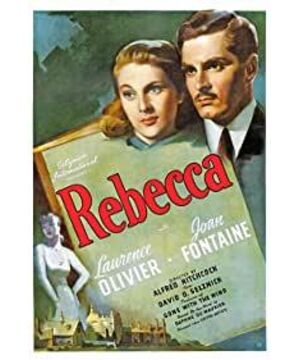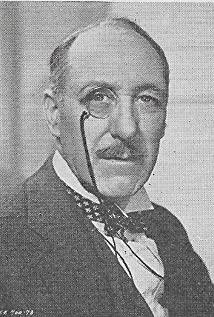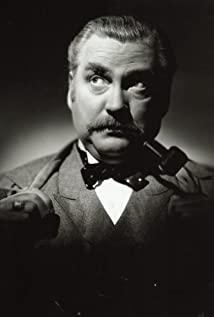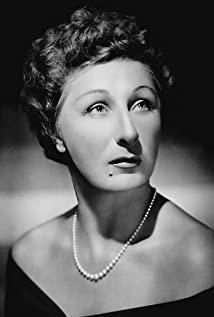This movie is believed to have been seen by many people and is one of Hitchcock's most classic works. Through the perspective of the heroine "I", to show the emotional entanglement between Rebecca, the real hostess of Mandoli, and the hero, Mr. Derwent.
At the beginning of the film, the heroine had a dream, in which she returned to Mandoli Manor. "We," the heroine and her husband, Mr. Derwent, see it as a tomb.
The heroine and Mr. Derwent met at a resort hotel, where the heroine was accompanied by a lady of high society. This is a more elegant name, but in fact it is just the maid of the other party.
The heroine and Mr. Derwent first met on the edge of a cliff near the hotel. At that moment, the heroine thought that the other party was going to jump into the sea. Because he looked at the sea with a solemn expression, it caused her to exclaim and stop him. But Mr. Derwent seemed annoyed at her stopping and turned away.
Soon they met again in the hotel, and when the lady accompanied by the heroine complained that there were no real nobles in the hotel now, she saw Mr. Derwent. It was a way of expressing Mr. Derwent's high social status through the mouths of others, and when they greeted each other, it also reflected their aristocratic blood in their names.
So whether it was a chance encounter in a restaurant, or after Mr. Derwent asked the heroine to go out with her, she was always cautious and kept trying to please each other. If Mr. Derwent is serious, the heroine starts to panic, and if the other party is angry, she is even more at a loss.
This way of dealing with each other is almost always the same.
The heroine had no mother in her childhood and grew up by her father's side. Her father didn't know if he was a painter because he only painted trees. Even if he can support his family by painting trees, his life should be very poor. After his father's death, the helpless heroine became the lady's female companion. This profession just made up for the lack of her mother's inability to get the experience of getting along with older women in her early years.
Mr. Derwent was an aristocrat, and his status made it natural for a heroine born to be a commoner to place him in a paternal position. What's more, the other party is personable and has a mysterious and melancholy temperament, which is inevitable to fascinate the heroine.
So how did the distinguished Mr. Derwent fall in love with the heroine?
Mr. Derwent's dead wife was a notorious beauty, and everyone praised her for having all the good qualities of a noble woman. It was natural to think that Mr. Derwent should have been devastated after her unexpected passing, so Mandori House never invited people to parties again.
But he felt more hatred for his wife's death. When the truth is revealed, he tells the heroine that he doesn't love Rebecca at all, he hates her. A girl who is so charming in the eyes of others, what did she do wrong to arouse her husband's hatred, so hated that she wanted to kill her with her own hands?
Mr. Derwent tells the heroine that Rebecca is a femme fatale and her life is horribly chaotic. Not only that, but she is also very scheming. She has long understood that he values the family's reputation very much. On the fourth day of the wedding, she offered to help him take care of the Mandoli Manor, but at the same time he could not interfere with his own freedom.
He thought that Rebecca had seduced Frank, his financier, but fortunately Frank resisted her temptation. She always quietly left the house alone, which Mr. Derwent interpreted as her having a private meeting with other men. And her most important lover is her cousin. They often meet in a log cabin by the sea, although he has never seen it with his own eyes.
Until one day, when Mr. Derwent thought he couldn't bear it and had to expose his wife, he followed her to the cabin. Rebecca told him that she was pregnant and that no matter who the child was in the future, he would inherit Mandori Manor and bear his surname. He felt that his patience had reached the peak, so he killed her by mistake, and then through a series of careful arrangements, disguised her death as a sea accident.
Was Rebecca really the woman Mr Derwent described it to be?
When Mr. Derwent married the heroine, he took her back to his Mandori estate. She was placed in the room facing the garden, but Rebecca's original room was facing the sea. Once she finally decided to take a look at this room, and found that it was bigger and more luxurious than her own, and this was the real master room.
Although Mr. Derwent thought she was already the hostess of the Mandari, he did not prepare the real master bedroom for her. She looks like an unjustifiable cheater. Everyone told her about Rebecca except her husband. Talk about her excellence, talk about her beauty, talk about how she turned this place into the most glamorous manor of high society when she was in Mandali. Frank, Mr. Derwent's financier, recalls Rebecca with sadness.
If Rebecca is really a flirtatious lady who plans to embezzle Mr. Derwent's estate, why are people so full of nostalgia for her?
So the real problem is Mr. Derwent, or Rebecca?
When Mr. Derwent first met the heroine, as a heroine whose social status was much lower than himself and there was a large age gap, her cautious behavior around him was understood by Mr. Derwent as a kind of sympathy for him. deep love. It is true that the heroine did fall in love with Mr. Derwent at first sight, but she was more in awe of his social status.
When the heroine and the lady hurriedly prepared to leave the hotel, she left the lady waiting in the car and rushed into Mr. Derwent's room to tell him that she was leaving and they might not see each other again. Mr. Derwent made the bold decision to marry her. It sounds like he should love her very much and decide to marry her when he doesn't want her to leave him. But in fact, this kind of behavior is very impulsive, because even if they return to London, it is not difficult to find the heroine in the small and closed circle of the upper class, as long as she is still serving the lady.
Mr. Derwent didn't make the proposal out of love, he needed the heroine to satisfy his narcissism, and the heroine did a good job. It was evident from their brief time together that Mr. Derwent would get angry without warning and get caught up in his own emotions. If this happens, the heroine is always very flustered, making Mr. Derwent feel how important he is in the eyes of the other party.
He needs this sense of importance to be fully noticed by others, so Mr. Derwent's satisfaction with importance comes to a head when the heroine runs the risk of offending the lady by running to tell him she's leaving. No one could understand why Mr. Derwent would marry a young girl who had known each other for a few days and whose identity was completely mismatched, yet the subconscious took over.
But Mr. Derwent didn't love his new wife. If he really loved the heroine, at least he could trust her and tell her what happened between him and Rebecca. Instead of making her nervous, she can only inquire about the situation of her loved ones by side-by-side. Not only did Mr. Derwent hide the fact that he had killed Rebecca, he didn't mention Rebecca as a person, and it caused insecurities in others.
Perhaps, on the surface, he was reluctant to mention it because of hatred and fear after killing, but he never let go of his feelings for Rebecca. We often say that the opposite of love is not hate, but indifference. Love and hate were one and the same. He hated Rebecca, but it was an emotional deformation after he loved her but was frustrated. Because he loved her, but didn't get the response he wanted, he turned this emotion into hate.
He still retains all Rebecca's possessions by his butler, as evidenced by his blindness to the suffering of the heroine. The most striking example, as I mentioned earlier, he even kept Rebecca's room, just as she never left, as if he had reserved a place for Rebecca in his heart.
The housekeeper used her words to stimulate the heroine many times, and she broke down several times, apparently because she did not want someone to replace Rebecca as Mrs. Derwent. But no matter what she was doing, what she said was to the point, revealing the crux of the problem between the heroine and Mr. Derwent.
Mr. Derwent's personality tendencies fall on the narcissistic-borderline spectrum, and are very much on the narcissistic end. His exaggerated self needs to be satisfied all the time, and the noble birth gives him this part of the satisfaction objectively, so his problems never have a chance to be corrected. Marrying the most beautiful girl he knew was part of satisfying his exaggerated self.
But Rebecca was a tough girl, and when they were really together, she couldn't satisfy Mr. Derwent's need for an exaggerated self. She likes partying, socializing, and dressing up. In the early days Mr. Derwent satisfied her all, bought her a few cabinets of clothes, and held various dances with her. Because this is a good time to show his spoils, the most beautiful stunner in his circle is his own, what could be more proud than this?
But the good times didn't last long, and Mr. Derwent wanted more than that. Marrying Rebecca can only satisfy the healthy narcissistic part of him. If Rebecca can be completely in control of herself and be affected by her emotions, it will prove that this woman loves her.
But Rebecca was not the heroine, and she didn't want to ruin her social activities because of a marriage, so these social activities became evidence of his wife's romantic nature in Mr. Derwent's eyes. On the one hand, he hopes to get the most shining woman, and on the other hand, he needs the other party to pay great attention to any negative emotions like the heroine. In the second marriage, once he had a conflict with the heroine, he always turned around and left, leaving the heroine alone in grief. How sad the other party is, how satisfied his narcissism is. But Rebecca was not such a person, and it was difficult for such a character to appear in the same person, so his feelings for Rebecca began to turn from love to hate.
During the police hearing, the shipyard owner had said that Rebecca often sailed the boat alone, so she was very familiar with the boat's performance without making a low-level error in opening the valve. It was an ingenious arrangement, and whether Mr. Derwent thought his wife's outings were all based on his imagination. And the real situation is that a wife who has no relationship with her husband goes out to sea alone in distress?
The seaside shack was full of Rebecca's stuff, and the room seemed like a safe haven for her to take a breather from her marriage. If, as Mr. Derwent said, she used the hut as a place for a tryst, why put it next to her home?
Although she had cancer, Rebecca told her husband that she was pregnant with someone else's child. She knew Mr. Derwent, and it would make him narcissistic and rage into unbelievably terrible things. So when she was dying, she smiled. Finally being able to say goodbye to this husband is her greatest revenge for this marriage. Just like Shakespeare's four tragedies "Othello", such a husband always feels that his wife is having an affair with someone else, and finally ends his wife's life.
When a person is on the narcissistic-borderline spectrum, and more towards one end of the spectrum, they may manifest in slightly different ways, but all share a strong desire to gain the loving attention of an important object. This craving can sometimes be morbidly strong, regardless of reality . They will even do a lot of excessive behavior to prove that if the other party never leaves me, then they really love me. However, such testing behavior does not occur occasionally, but occurs frequently, and eventually leads to the other party's unbearable departure.
In psychological counseling, as a counselor, we often encounter such clients. They test whether the counselor can really be stable there through various forms. They may lament that recent financial difficulties have prevented them from being able to pay consulting fees. However, in the subsequent conversation, it will be revealed that he has recently planned to travel abroad, and that he can fully afford the high travel expenses. I also hope that the consultant can change the consultation time, so that he can occupy the time slot of other visitors of the consultant to reflect his uniqueness to the consultant.
At this time, it is useless to just meet the needs of the other party. As the heroine did, once Mr. Derwent left in anger, she could only cry helplessly, or keep chasing each other for a channel of communication. Only by showing them over and over again that they seem to want to get closer to each other, but are actually pushing them away, can they gradually recover.
Of course, this process is very long, and it is not as easy as typing a paragraph in front of the computer. Going back to the film, when the housekeeper learned that her beloved mistress Rebecca was murdered, she angrily burned down Mandali Manor. The film did not explain what happened to Mr. Derwent and the heroine. Perhaps out of the shadows of Mandori Manor and Rebecca, they would be happy elsewhere. But Mr. Derwent is the tomb-like Mandala Manor. As long as he lives with him, can the heroine really be happy?
Fontaine is so beautiful, but everyone who sees the heroine exudes that "you're far worse than Rebecca" look. It is precisely because of this treatment that the imagination of the audience can be stimulated. Once this kind of imagination is concretized and there is really an actress playing this role, there will always be people who feel that they do not meet the standards of beauty in their minds. No one interprets Rebecca's beauty, but instead allows the audience to project it freely. Therefore, Rebecca has become the most beautiful woman in film history.
If you want to join the movie psychology reader group, please contact the platform assistant WeChat: xinliwanka, customs clearance password: I am a reader. If you think our article is still a little interesting, maybe you can give some suggestions and help, welcome to like and forward, or reward and support the main creator. If you want to know more about the main creator, you can follow Weibo: Psychological consultant Jia Rui.
View more about Rebecca reviews











